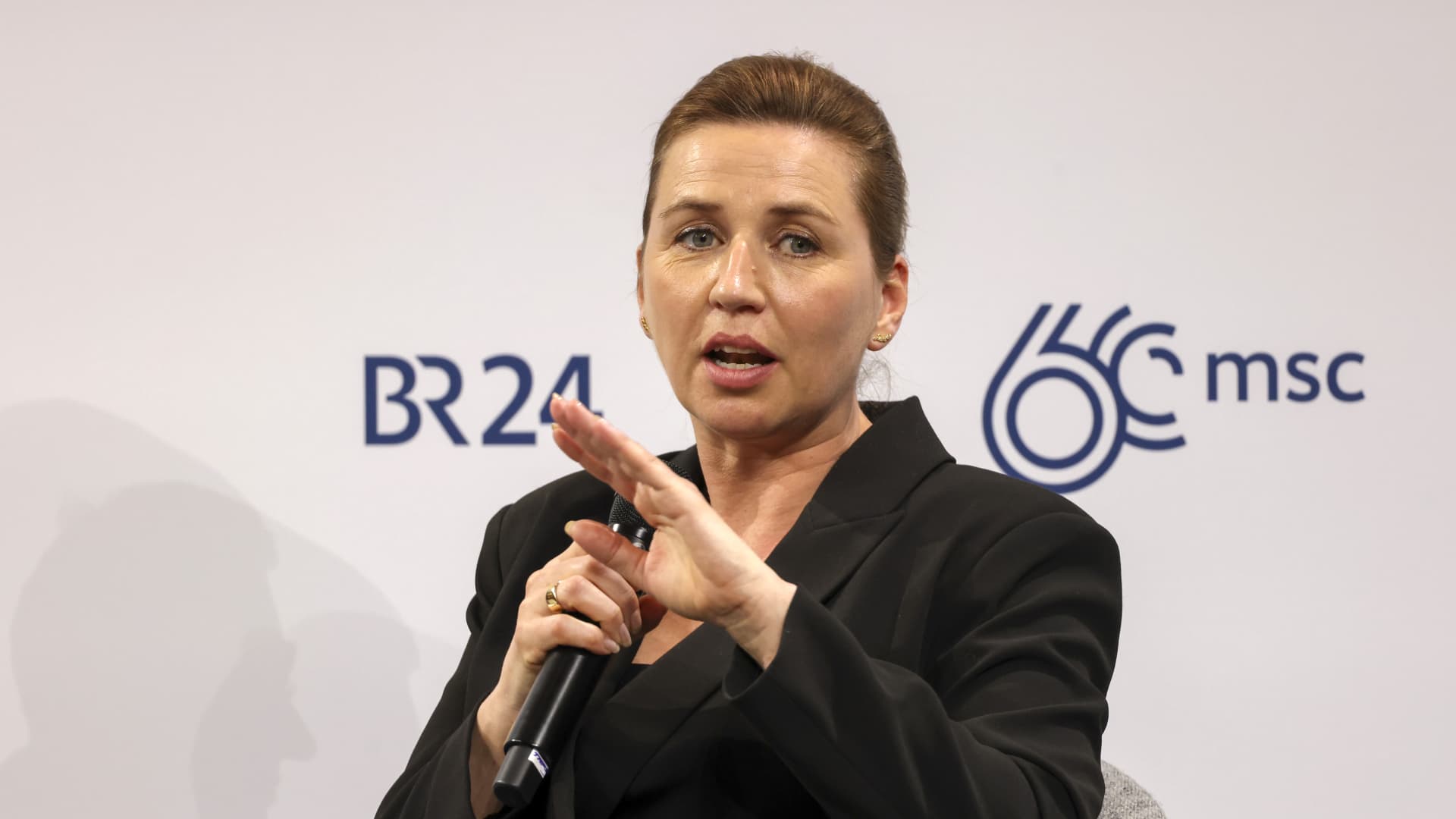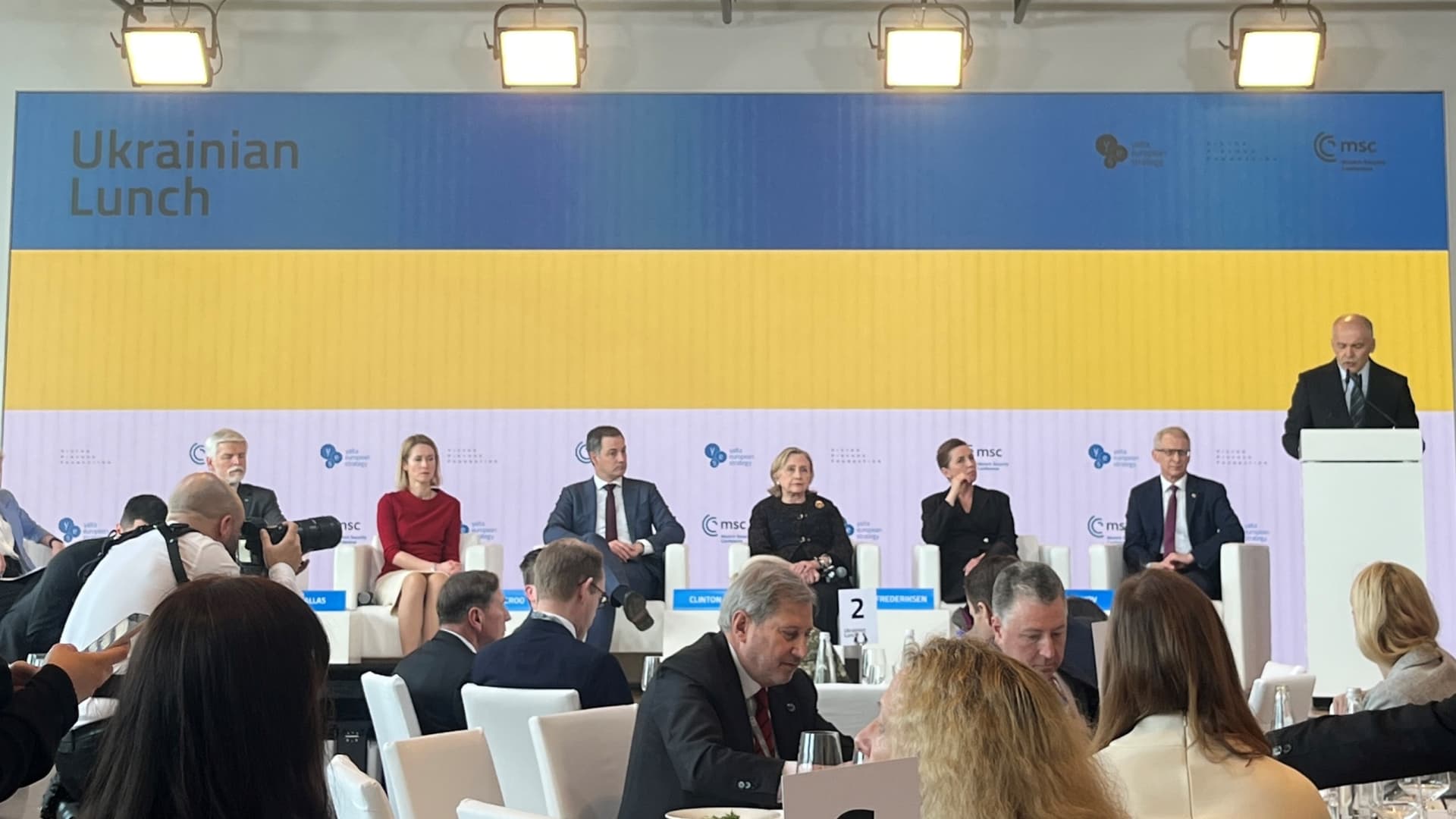
- The West is suffering a "colossal failure of imagination" in thinking Russia's war in Ukraine will not hit them next, defense policymakers heard at Munich Security Conference.
- "The sense of urgency is simply not clear enough," Danish Prime Minister Mette Frederiksen said, joining European leaders in calling for more arms for Ukraine as the war enters its third year.
- Hillary Clinton said "reality should have overcome" any pushback from the U.S. House in funding more support for the war-torn country.

MUNICH, Germany — The West is suffering a "colossal failure of imagination" in thinking Russia's war in Ukraine will not hit them next, European policymakers have been told amid calls for a doubling down of transatlantic support for Kyiv.
Danish Prime Minister Mette Frederiksen criticized a waning sense of urgency among delegates at the Munich Security Conference on Saturday as Moscow's full-scale offensive nearly enters its third year.
"The sense of urgency is simply not clear enough in our discussions," Frederiksen told a lunchtime session. "We have to speed up and we have to scale up."
Frederiksen called out Europe's claims of production constraints as a reason for failing to provide more military assistance to Ukraine, noting that the continent has existing stockpiles it could and should share.
"This is not only a question about production because we have weapons, we have ammunitions, we have air defense that we don't have to use ourselves at the moment, that we should deliver to Ukraine," she said.
Money Report
Denmark has now donated its entire artillery to Ukraine, Frederiksen said, urging other countries to do the same as the war marks its second anniversary on Feb. 24.
"On Saturday, there should be new deliveries," she said. "Words will not solve this situation."
Feeling out of the loop? We'll catch you up on the Chicago news you need to know. Sign up for the weekly> Chicago Catch-Up newsletter.
Frederiksen's sentiment was echoed by others in the room. The policymakers were speaking at the 7th Munich Ukrainian Lunch, hosted on the sidelines of the MSC by the Yalta European Strategy (YES) forum and Ukrainian non-profit the Victor Pinchuk Foundation. Sweden's Foreign Minister Tobias Billström said countries must give Ukraine "what we already have."
The comments came hours after Ukrainian troops withdrew from the eastern city of Avdiivka, a longtime military stronghold, to avoid Russian encirclement. The fall of Avdiivka marks the biggest change on the frontlines since Moscow captured Bakhmut in May, and provides Russia with a new base from which to launch regional attacks that can be presented back home as a moral-boosting success.
Russian forces now reportedly control just under one-fifth of Ukraine's internationally recognized territory. As they advance further into the country, seizing more territory and installing Russian leadership via sham elections, Ukrainian forces could conceivably be forced to eventually fight for Moscow, Poland's foreign minister said.
"He [Putin] will draft Ukrainians into his army to attack us," Radosław Sikorski said.
The dogs of war
Bulgaria's Prime Minister Nikolay Denkov said he believed politicians were beginning to recognize the urgency of that reality, but that it was now up to them to convince their electorates, too.
"We have to open the eyes of every citizen in Europe to understand that the life that we enjoy, the life that we want to be safe can disappear as it happened many times in history," Denkov said. "It is urgent."
As the war has rolled on, public interest has shifted away from Ukraine and toward other global crises, including in the Middle East, as well as domestic political and security concerns.
In the U.S., a new bumper funding package, which includes $61 billion for Ukraine, is currently held up in the House of Representatives as lawmakers contest the relevance of Eastern Europe's war to American interests.
Former U.S. Secretary of State Hillary Clinton said Saturday that she was hopeful the bill would pass — likely in March — and insisted that "reality should have overcome" whatever hesitancy there was in both the U.S. and Europe to provide further ammunition to Ukraine.
"We have to do a much better job of convincing ourselves, of convincing our countries, our governments that we have to stand with Ukraine and make sure that they do win," she said in Munich.
That urgency was also hammered home by Ukrainian soldiers who spoke at the event. One woman, a former college lecturer who went to fight on the front lines and was held in captivity for three months, moved many in the room to tears and prompted a standing ovation as she described her people as "the dogs of war."
"We are the dogs of war," she said. "The more blood you give her [war], the more she wants."
Colossal failure of imagination
Historian Niall Ferguson, meanwhile, chastised Western leaders for their "colossal failure of imagination" to see that they, too, could become those "dogs of war."
"It's as if we just can't imagine it happening to us," he said, invoking images of Europeans and Americans fighting during World War II. "Why can't we imagine this?"
"We must help our people imagine those dogs of war," he continued. "Make these dogs of war seem visible to voters, visible to politicians."
That responsibility is even more pressing as Russia steps up its psychological war, Clinton said, referencing what she described as an "extraordinary" effort by Moscow to influence minds and political decision-making.

"We see an extraordinary effort, a successful effort, I believe, to influence minds, to affect political decision-making, to make it difficult for political leaders in Bulgaria and elsewhere to really convince populations, because they're getting so many other messages through social media and other sources," she said.
A December report found that fake TikTok accounts have been used to spread disinformation on Russia's war in Ukraine to millions of people and "artificially amplify pro-Russian narratives."
"We can't just assume that that is an area that they [Russia] are going to dominate without giving them a fight, and we are not even in the same arena," Clinton continued, noting that Russia already influences large swathes of Africa, Asia and Latin America.
"Their message about what this war is about, who the aggressor is, what the consequences are, is going unanswered."






